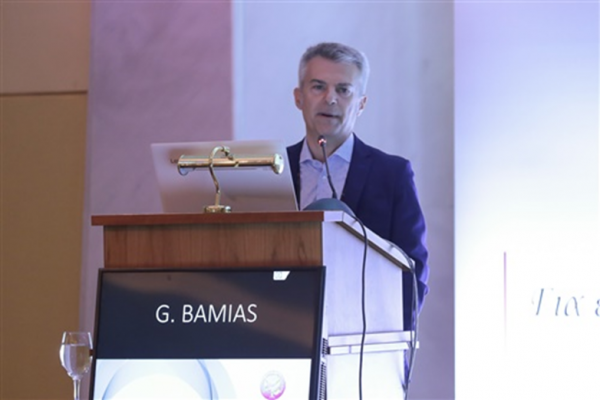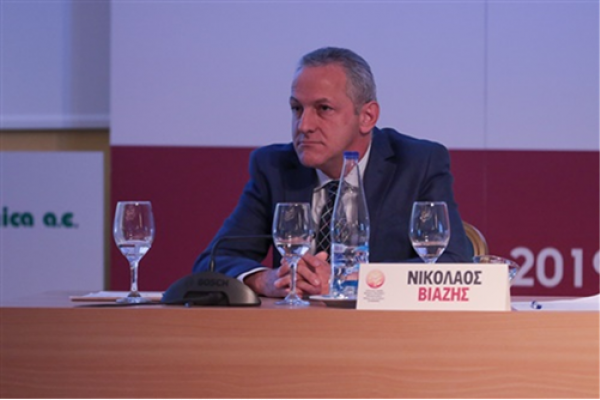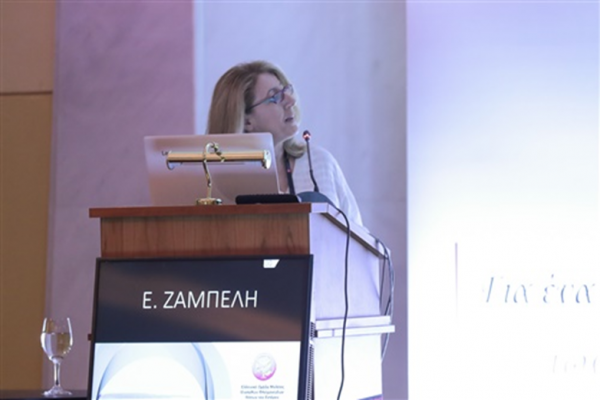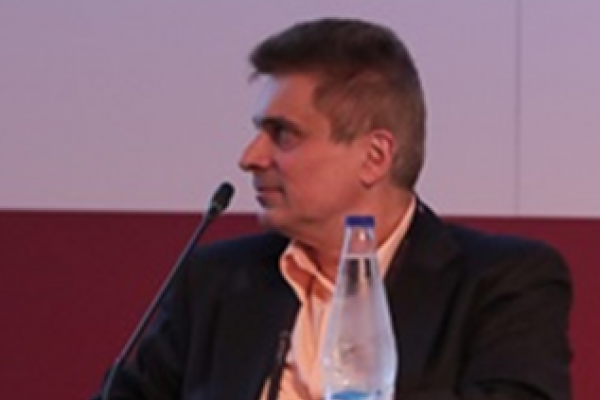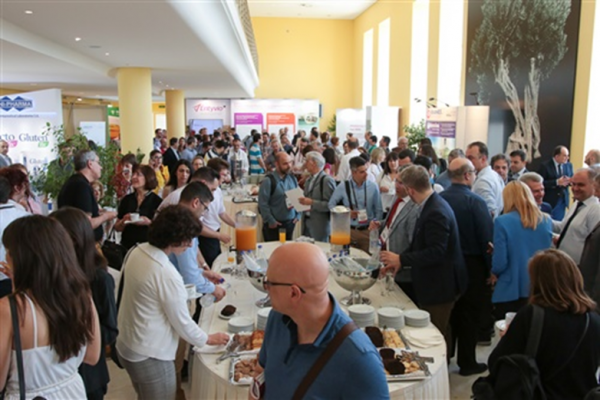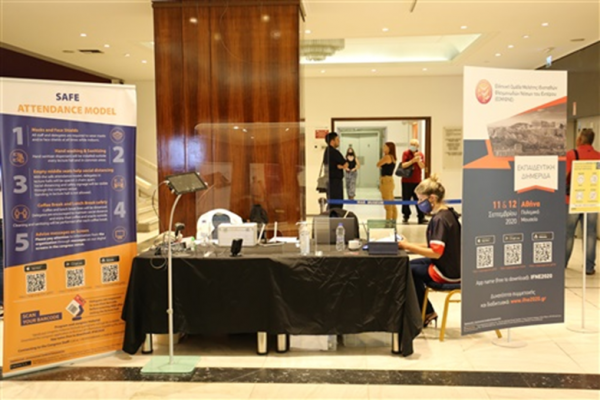ECCO Country Member Profiles: Greece
 |
Greece |
Name of group: Hellenic Group for the Study of Inflammatory Bowel Diseases (EOMIFNE)
Number of active members: 176 regular members and 18 honorary members
Number of meetings per year: one (1) annual congress and various one-day meetings and webinars (approximately three to six per year). Training school for Inflammatory Bowel Disease with five annual two-day lessons, accepting participants (specialists or trainees) from all over Greece who have a special interest in Inflammatory Bowel Diseases and want to increase their knowledge.
 © EOMIFNE |
 © EOMIFNE |
Name of president and secretary: Georgios Bamias (President), Evanthia Zampeli (Secretary)
National Representatives: Georgios Bamias, Dimitrios Christodoulou
Joined ECCO in: 2003
Incidence of IBD in the country: The incidence of IBD was estimated in older studies from the Epirus and Crete regions. For UC the incidence was 5.6/8.9 per 100,000 inhabitants and for CD, 2.0/3.0 per 100,000 inhabitants, respectively, placing Greece in the group of countries with a low to moderate incidence. An ECCO-EpiCom study including data from Ioannina showed an incidence of UC (in the area of Ioannina for the years 2010/2011) of 6.0/3.6 per 100,000 inhabitants while that for CD was 3.5/3.6 per 100,000 inhabitants. The impression is that the incidence of IBD is increasing in Greece and our group plans to organise a new nationwide study.
What has changed since your society became an ECCO Country Member?
In 2017 a new governing structure for EOMIFNE was introduced. The Governing Board now consists of the President, Vice President/President Elect, Secretary General, Treasurer and Liaison President (who is the Former President). These posts are elected by the General Assembly and elected members serve for 3 years. The five core members recruit a Scientific and an Educational Officer. The Governing Board assigns an Organising President for its Annual Conferences from among the EOMIFNE members and oversees the scientific and administrative aspects of it.
In 2017 an open funding process was launched with the aim of supporting clinical and basic research projects by Greek IBD-focussed scientists. The Governing Board of EOMIFNE has set as its priority the understanding and definition of the epidemiological and phenotypic characteristics that are unique to Greek patients with IBD, based on the hypothesis that the unique geographical position and specific dietary patterns, which include the Mediterranean diet, may affect the natural history of IBD in the Greek population. These factors may explain the generally milder course of IBD in Greece as compared to Western countries. EOMIFNE has been funding various research protocols. It also supports research and training activities of young Greek gastroenterologists in international IBD centres of excellence through annual scholarships.
At the educational level, EOMIFNE has recently launched two new initiatives. The first is the IBD School, a 32-hour intensive course for a limited number of participants with the aim of providing advanced knowledge on all aspects of IBD and in line with the recently presented ECCO IBD Curriculum. The second is the organisation of meetings with patients and local GPs in several Greek cities in order to alert non-gastroenterologists to the clinical manifestations of IBD and to educate patients on a holistic approach to their condition. In addition, EOMIFNE is actively involved in the development of national guidelines for the treatment of UC and CD patients and in the translation of ECCO-EFCCA Patient Guidelines into Greek, including the ECCO-EFCCA Patient Guidelines. In the era of the coronavirus pandemic, we plan to organise educational webinars and to have a web-based intensive course.
Since EOMIFNE became a member of ECCO, several members of EOMIFNE have held or currently hold administrative positions in ECCO (Gerassimos Mantzaris, Konstantinos Katsanos, Konstantinos Karmiris). Furthermore, members of EOMIFNE have been actively involved in ECCO Workshops and in GuiCom. EOMIFNE has also supported and facilitated Greek participation in the ongoing I-CARE Study.
What are the benefits to you of being an ECCO Country Member?
Being a member of ECCO has been of paramount significance in several ways. ECCO has been a model organisation for IBD and several of its functions can be applied at the national level. In addition, ECCO provides support through expert advice on research efforts at the local level. It may also serve as the platform to spread research ideas from the national to the European and even the global level. It supports our educational activities and offers the opportunity to organise international conferences within Greece (we still receive positive feedback regarding the ECCO Educational Workshop hosted in Greece in 2018). ECCO is supporting the education of young doctors by offering them the opportunity to participate in the IBD Intensive Course for trainees at the ECCO Congress. It also helps Greek scientists to attend meetings to exchange ideas and develop multinational collaboration projects. ECCO has also been very supportive to nurses, helping them to become specialised in IBD. Finally, ECCO serves as a guide for the patient organisations.
At the clinical level, ECCO Guidelines, which are frequently and constantly updated, provide clinicians with a roadmap to solve the multifaceted everyday problems of IBD patients. ECCO Congress is a meeting place for all IBD-focussed clinicians and basic researchers and offers opportunities to gain expertise, exchange scientific ideas, and initiate multicentre research projects, thereby promoting not only collaboration but also interpersonal relationships between individual members. The launch of the UR-CARE project has afforded all doctors a unique opportunity to use a common database for their patients and also to integrate them into an international database, which will be a valuable tool for exchanging knowledge and participating in clinical research projects.
Is your society making use of the ECCO Guidelines?
The ECCO-EFCCA Guidelines have been translated to Greek and distributed to all interested parties. Both the original and the translated versions are easily accessible through our website. Furthermore, at our Annual Congress any update on ECCO Guidelines is thoroughly presented and discussed as part of the scientific programme. The ECCO Guidelines are also taught in the Intensive IBD School of EOMIFNE, which is organised every year, as mentioned above.
Have you developed links with other countries through your ECCO Country Membership?
- Have you developed research projects with other countries through your ECCO Country Membership?
Several members of our Group are actively participating in research projects in close collaboration with ECCO Members from other countries.
Have you developed educational activities with other countries through your ECCO Country Membership?
As part of our Annual Congress, we have invited members of neighbouring countries to present their organisational structure and scientific interests and explore ways of developing common projects.We have not yet established such a formal exchange programme. However, we support scholarships to enable young gastroenterologists and trainees to attend international IBD centres with mentors, clinicians and researchers who have a pivotal role in ECCO Administration, Research and Education.
- Has your country been involved in a fellow exchange through ECCO?
We have not yet established such a formal exchange programme. However, we support scholarships to enable young gastroenterologists and trainees to attend international IBD centres with mentors, clinicians and researchers who have a pivotal role in ECCO Administration, Research and Education.
What are your main areas of research interest?
As mentioned above, the main research interest of EOMIFNE is to understand and define the epidemiological and phenotypic characteristics that are unique to Greek patients with IBD, based on the hypothesis that the unique geographical position and specific dietary patterns, which include the Mediterranean diet, may affect the natural history of IBD in the Greek population. Further fields of research include response to medical treatment of IBD patients in Greece, study of extraintestinal manifestations, drug-related toxicity and quality of life of IBD patients.
Does your centre or country have a common IBD database or bio bank?
There is currently no common IBD database for Greek patients. There is also no unified bio bank for IBD, although several independent centres have developed separate IBD bio banks in recent years. Furthermore, EOMIFNE encourages all of its members to apply for access to UR-CARE in an effort to incorporate Greek IBD patients into a unified database.
What are your most prestigious/interesting past and ongoing projects?
Several Greek IBD centres are actively involved in both basic and clinical research in IBD, and this research is often supported by EOMIFNE from both the financial and the scientific perspective. A recent EOMIFNE-endorsed publication has delineated the spectrum and associations of extraintestinal manifestations in Greek IBD patients. Current research projects with EOMIFNE involvement are focussing on the effect of dietary habits of patients with IBD and on the clinical history of postoperative CD.
Which ECCO Projects/Activities is the group currently involved in?
Several members of EOMIFNE hold administrative positions in ECCO (e.g. Konstantinos Karmiris, Education Committee). Furthermore, members of EOMIFNE are actively involved in ECCO Workshops and GuiCom (e.g. G Mantzaris, I. Koutroubakis, K. Katsanos). EOMIFNE has also supported and facilitated Greek participation in the ongoing I-CARE Study.
 Ioannis Koutroubakis © EOMIFNE |
 Gerassimos Mantzaris © EOMIFNE |
 Konstantinos Katsanos © EOMIFNE |
What are your aims for the future?
The main aim of EOMIFNE is to improve the quality of health care for patients with IBD in Greece. To achieve this goal, we will try to spread knowledge among patients and health care providers on critical issues regarding early recognition of IBD, appropriate diagnosis, implementation of newer techniques and incorporation of recent evidence regarding optimal therapy. Our ultimate goal is to create a network involving all gastroenterologists who treat patients with IBD and to unify their approach to its management.
In addition, we aim to create and fund research groups working on various projects in IBD. In particular we will try to serve as a common platform that will facilitate the collaboration of Greek IBD centres and the development of multicentre epidemiological, clinical and therapeutic studies.
How do you see ECCO helping you to fulfil these aims?
ECCO can help National Societies, including EOMIFNE, in several ways. These include but are not limited to the provision of expert advice on how to initiate and execute clinical research programmes and of links to other National Societies so as to facilitate collaborative projects. ECCO can also financially support basic research efforts through National Societies for scientists coming from countries with less access to funding opportunities and help them to start their projects. ECCO should continue to support the education of young doctors by offering participation at the IBD Intensive Course for Trainees and other ECCO Educational Activities.
What do you use ECCO for? Network? Congress? How do you use the things/services that ECCO has to offer?
ECCO supports our educational activities and offered us the opportunity to organise a successful Educational Workshop in Greece in 2018. Since ECCO offers significant support to nurses and helps them to become specialised in IBD, we have encouraged the participation of our nurses in such activities. Finally, as ECCO involves patient organisations in decision making and designing the plan for appropriate management, we have created contacts between our local groups and ECCO Authorities. It is well known to all Greek gastroenterologists, GI nurses, dietitians and patient organisations that EOMIFNE is the specialist medical society for Inflammatory Bowel Diseases and offers knowledge, education and research, and patient treatment and support in close collaboration with ECCO. Our local society follows and adopts ECCO Guidelines and encourages participation in all ECCO Activities, including conferences, workshops and webinars.
Pictures are subject to copyright © EOMIFNE



